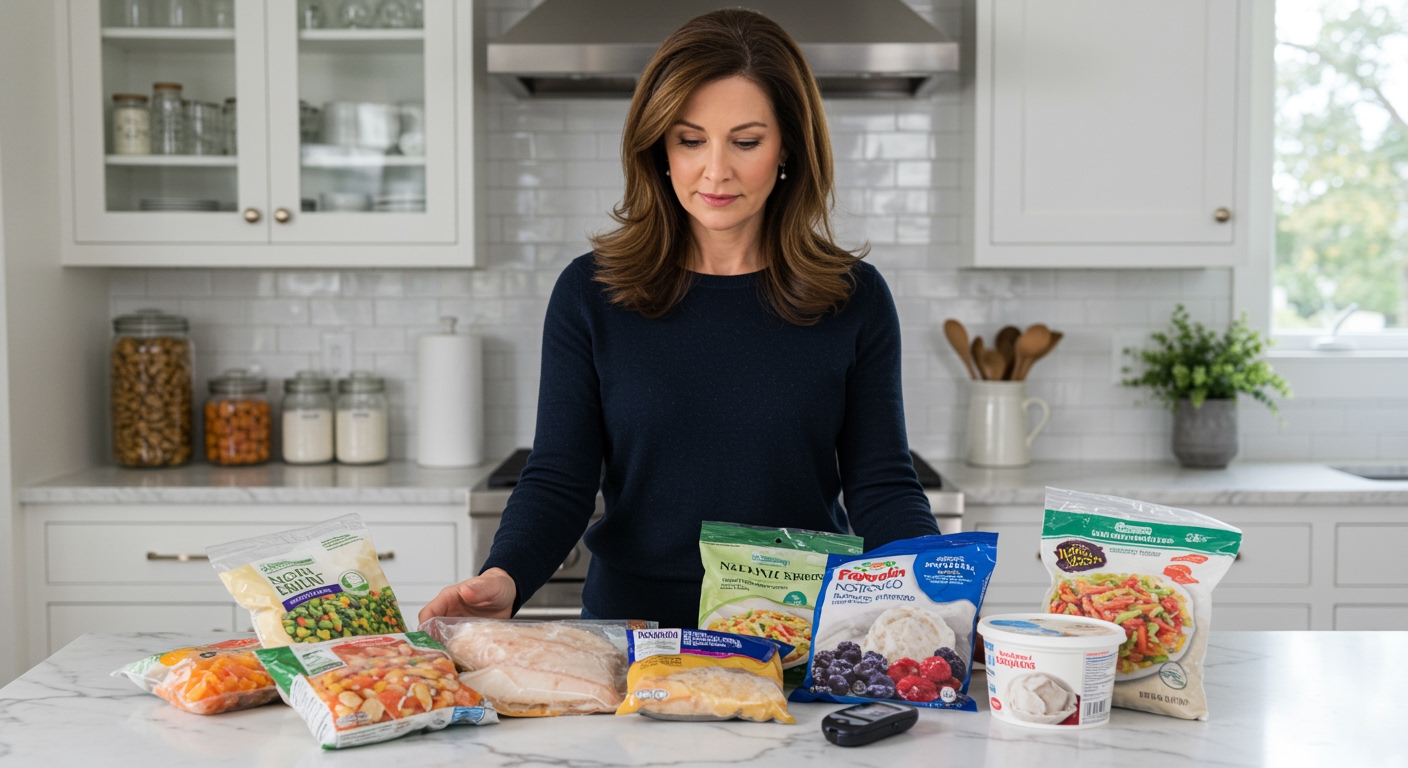✪ Key Takeaway: Diabetics can eat many frozen foods safely, but must avoid high-sodium processed options and choose plain frozen vegetables, fruits, and lean proteins.
Introduction
Your doctor just told you that you have diabetes, and suddenly every food choice feels like walking through a minefield.
You stand in the frozen food aisle wondering if those convenient packages are now completely off-limits, especially since you heard that people with high blood pressure should avoid them.
Hi, I’m Abdur, your nutrition coach, and today I’m going to explain exactly which frozen foods work for diabetes management and which ones you should definitely skip.
Why Do People Think All Frozen Foods Are Bad?
The confusion about frozen foods comes from mixing up two completely different categories of products.
Plain frozen foods like vegetables, fruits, and unprocessed meats are actually nutritionally superior to many fresh options because they get frozen at peak ripeness.
The problem lies with processed frozen meals that companies load with sodium, preservatives, and hidden sugars to extend shelf life and enhance flavor.
These processed options can contain up to 1,500 milligrams of sodium per serving, which is nearly your entire daily limit.
When your blood pressure rises from excess sodium, your body struggles to process glucose efficiently, making blood sugar control much harder.
This creates a dangerous cycle where poor food choices worsen both diabetes and hypertension simultaneously.
✪ Fact: Plain frozen vegetables retain 90% of their nutrients compared to fresh vegetables that lose nutrients during transport and storage.
Which Frozen Foods Actually Help Diabetes Control?
Frozen vegetables without added sauces or seasonings are your best friends for diabetes management.
Broccoli, spinach, cauliflower, and green beans provide fiber and nutrients that help slow glucose absorption in your bloodstream.
The fiber in these vegetables acts like a natural brake system, preventing rapid spikes in your blood sugar after meals.
Frozen berries offer antioxidants and natural sweetness without the blood sugar rollercoaster that comes from processed desserts.
Plain frozen fish and chicken provide high-quality protein that helps stabilize blood sugar levels throughout the day.
Protein triggers the release of hormones that signal fullness to your brain while requiring minimal insulin for processing.
This combination makes frozen proteins an excellent choice for maintaining steady energy levels between meals.
✪ Pro Tip: Buy frozen vegetables in bulk during sales and store them for up to 12 months without losing nutritional value.
What Makes Some Frozen Foods Dangerous For Diabetics?
The biggest threats in frozen foods are hidden sugars and excessive sodium that work together to wreak havoc on your metabolism.
Frozen dinners often contain high fructose corn syrup, modified corn starch, and other blood sugar bombs disguised with fancy names.
These ingredients cause rapid glucose spikes that force your pancreas to work overtime producing insulin.
The excessive sodium in processed frozen meals causes your kidneys to retain water, increasing blood volume and putting extra strain on your cardiovascular system.
When your blood pressure rises, your body becomes more insulin resistant, making it harder to control blood sugar levels naturally.
Frozen pizza, breaded fish sticks, and sweetened frozen yogurt are particularly problematic because they combine refined carbohydrates with unhealthy fats.
This combination triggers inflammation in your blood vessels and makes your cells less responsive to insulin signals.
✪ Note: Foods with more than 600mg sodium per serving can significantly impact blood pressure within hours of consumption.
How Should Diabetics Shop The Frozen Food Section?
Start by reading the ingredient list on every package before looking at anything else.
If you see more than five ingredients, or ingredients you cannot pronounce, put that item back on the shelf immediately.
Look for products where the main ingredient is the actual food item, like “broccoli” or “salmon,” rather than a long list of chemicals and preservatives.
Check the sodium content and aim for options with less than 300 milligrams per serving to protect your blood pressure.
Avoid anything with added sugars, syrups, or words ending in “-ose” which are all different forms of sugar that will spike your glucose.
Choose plain frozen items that you can season and prepare yourself, giving you complete control over sodium and sugar content.
This approach lets you enjoy the convenience of frozen foods while maintaining the nutritional quality your body needs for optimal diabetes management.
✪ Pro Tip: Shop the outer edges of the frozen section first, where plain vegetables and proteins are usually located.
The Bottom Line
Frozen foods can absolutely be part of a healthy diabetes management plan when you choose wisely and avoid the processed traps.
Smart food choices are not about perfection, they are about making better decisions more often than not.
I would love to hear about your experiences with frozen foods and diabetes management, so please share your questions or success stories in the comments below.
References
At NutritionCrown, we use quality and credible sources to ensure our content is accurate and trustworthy. Below are the sources referenced in creating this article:
- WebMD: Slideshow: Worst Foods for High Blood Pressure
- Healthline: Low Sodium Frozen Meals
- National Kidney Foundation: 5 Foods to Avoid if You Have High Blood Pressure
- UC Davis Health: Your Guide to Low Sodium Eating and How to Lower Blood Pressure





